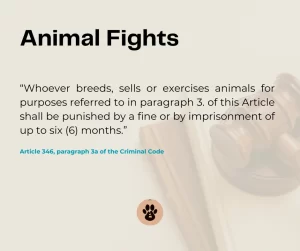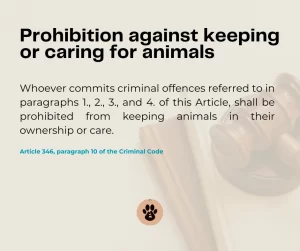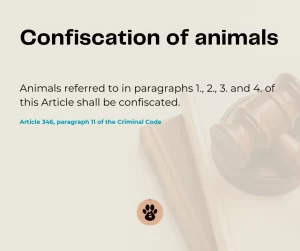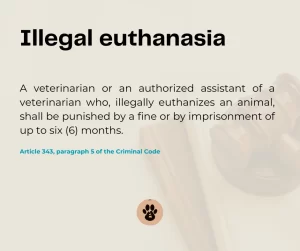Due to the joint engagement of the Animal Rights Foundation and the Committee, these changes are now in force, which represents a pivotal moment in the country’s dedication to combating animal cruelty and exploitation.
While we are pleased with the progress made and the legal changes that have been included, it’s important to note that ARF advocated for further changes, including addressing issues such as wanton killing of animals, inadequate animal care, and abandonment of companion animals, emphasizing the urgent need for law enforcement to prioritize these matters. Additionally, we proposed amendments aimed at enhancing the protection of wild animals.
Although not all of our recommendations were incorporated, we are grateful that the majority of our concerns were carefully considered and integrated into Law no. 08/L-188 On amending and supplementing the Criminal Code No. 06/L-074 Of the Republic of Kosovo.
This collaborative effort reflects our shared commitment to advocating for the welfare of animals and underscores the importance of continued cooperation between governmental bodies and animal rights organizations to ensure comprehensive legal protection for all sentient beings. We remain dedicated to advancing further reforms and fostering a society where animal welfare is upheld as a fundamental value.
Among the notable revisions is the addition of a new paragraph to Article 343 of the Criminal Code, specifically targeting illegal euthanasia of animals. This provision now stipulates that veterinarians or their assistants found guilty of unlawfully euthanizing animals face penalties ranging from fines to imprisonment for up to six months. This crucial amendment underscores the gravity of ensuring humane treatment even in the most delicate circumstances.
Furthermore, amendments to Article 346 signify an improvement on the stance against forms of animal abuse. The revised legislation imposes harsher penalties on individuals found guilty of maltreating animals or engaging in sexual acts with them for any purpose. Such offenses are now punishable by fines or imprisonment for up to one year, doubling the previous penalty.
Additionally, the updated provisions also target the insidious practice of organizing animal fights, a barbaric form of entertainment that inflicts immense suffering upon animals. Those involved in orchestrating, funding, or participating in such cruel activities now face even more severe repercussions, including imprisonment for up to two years—an increase from the previous penalty, which capped imprisonment at one year.
Importantly, a new provision has been added to address the breeding, selling, or exploitation of animals for fighting purposes, imposing stringent penalties, including imprisonment for up to six months.

A groundbreaking addition to the criminal code is the inclusion of provisions targeting the production, distribution, and possession of materials depicting sexual acts or violence against animals. Individuals involved in the dissemination or possession of such content without valid scientific or cultural justification are subject to fines or imprisonment for up to one year. This proactive measure aims to curb the demand for such reprehensible materials and protect animals from further exploitation.
Furthermore, the legislative amendments extend beyond punitive measures to include preventive measures aimed at deterring repeat offenders. This was very important for ARF as we saw that many people who abused animals and expolited them for dog fight or cruel breeding, were allowed to keep those animals and further continue with their actions, despite a fine of 300 euros given from the Court. Individuals convicted of animal-related offenses are prohibited from owning or caring for animals, ensuring that those who have demonstrated a disregard for animal welfare are deprived of the opportunity to inflict further harm.

It’s worth mentioning that the legislation emphasizes the importance of rehabilitation by mandating the confiscation of animals subjected to cruelty or exploitation. This provision ensures that animals rescued from abusive environments are provided with the care and protection they deserve, while holding perpetrators accountable for their actions.

In conclusion, the recent amendments to Kosovo’s Criminal Code represent a significant milestone in the ongoing battle against animal cruelty. By enacting stringent penalties, preventive measures, and provisions for rehabilitation, Kosovo is making steps forward towards its commitment to promoting compassion, justice, and respect for all living beings.
However, enacting laws alone is not sufficient; it is equally crucial to ensure their effective implementation. Kosovo must now focus on creating the necessary mechanisms to enforce these new legal changes diligently. This entails bolstering law enforcement efforts, providing adequate resources and training for officials tasked with upholding animal welfare laws, and fostering public awareness and engagement to cultivate a culture of respect and accountability towards animals. Only through concerted action and unwavering commitment can Kosovo truly translate these legislative reforms into tangible improvements in the lives of animals across the country. ARF for sure will continue with its important role on supporting law enforcement institutions to get further training and education on the field of animal abuse and neglect.
We heartly thank the Committee members, Mrs. Fitore Pacolli, the Ministry of Justice and other stakeholders involved in the amendment of the Criminal Code, for being a voice for the animals!

